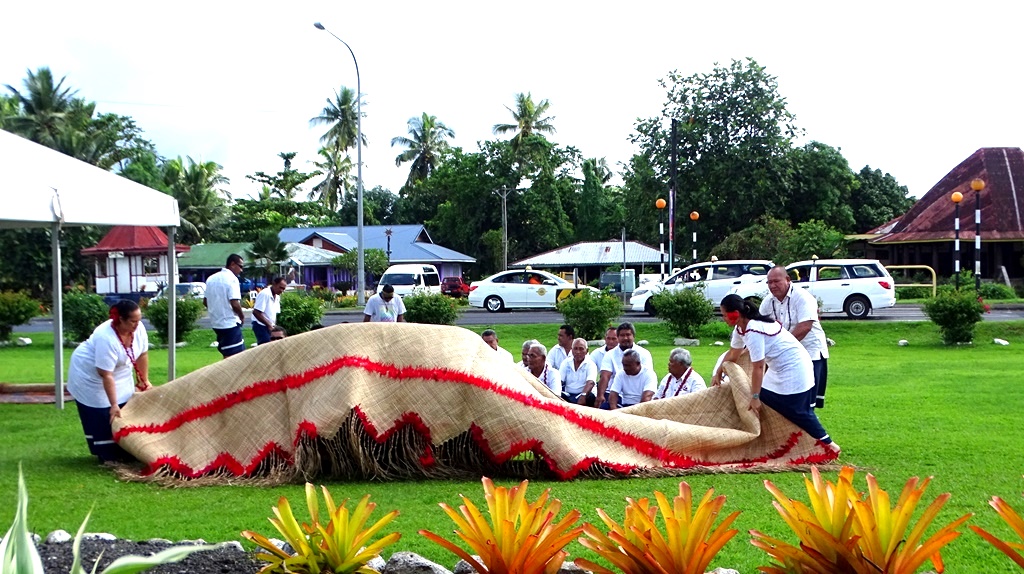Latest
NZ District Court to consider the application of the Samoan Ifoga in their legal system

By Lagi Keresoma
APIA, SAMOA – 30 MARCH 2023: The Samoan traditional apology – Ifoga has been accepted in the Samoan legal system as part of the mitigating factors when Judges deliver a sentence over a serious offence such as murder.
Yesterday, the judges of New Zealand District Court experienced the ceremony as demonstrated by the village of Vaimoso where the offenders sought the forgiveness of the aggrieved family who lost a young man in the hands of the offenders.
Two members of the offending party were covered in a huge fine mat infront of the aggrieved family’s residence, as more of their party sat solemnly just behind.
Meanwhile, realising the visitors, some able bodied men of the aggrieved family appeared armed with bushknives and axes shouting their anger and disappointment at what had happened.
[Editors’ Note: In real situations, despite being in the wrong, the offending party also come prepared and armed in the event the Ifoga is rejected and things may turn violent.]
After consultation, and when the aggrieved family accepts, the family chief will remove the fine mat and greet those who had been covered signalling the apology has been accepted. Then the orators between the offending and aggrieved parties take over to be followed by presentations of fine mats, food and money.
The exchange will ensure forgiveness prevails and that peace will be maintained between the two parties’ families and their respective villages.

Members of the offending party sit solemnly with heads bowed and vulnerable as some members of the aggrieved family are armed with bushknives and other weapons.
“It is one thing to hear and read about Ifoga but it is very different when you see it for real or at least get a glimpse of how it is done,” New Zealand Chief District Court, Judge Heemi Taunaumu told Talamua.
One of the Judges said to see the perpetrators family belittle themselves in the face of the aggrieved family members armed with machetes and axes shouting, sent chills down ones’ spine.
“The New Zealand Judges were really privileged to observe a very important cultural practice in Samoa and the Ifoga is something that we will be able to take back to New Zealand and we will be thinking about how to understand that particular cultural context within what we have to do in New Zealand,” said Judge Taunaumu.
He told Talamua that they need to ensure their approach is culturally accurate with people living in New Zealand practising the cultural apologies and how it might bear on the Courts’ approach when they are dealing with people living in New Zealand.
“It is something to look at carefully. Understanding of it I think will enhance not just witnessing the proceedings and procedure, but by being present and feeling the seriousness of the ceremony and the humility involved during the offering of the apology,” said Judge Taunaumu.

The two parties reconcile after the acceptance of the Ifoga.
He referred to the way the aggrieved family was able to express their feelings openly in a way that the orators and chiefs were also able to make ways towards a balanced settlement of the issue.
He noted how vulnerable the perpetrators family were and the idea of making themselves very small and very vulnerable to whatever the aggrieved family could do.
He also took note of the influence and presence of orators and chiefs.
“The presence of orators and chiefs was a very important feature and is very important for us to understand the beauty of the oratory, the images we saw and various references to the custom,” he said.
Although it was just a demonstration, Judge Taunaumu said he felt it was so real.
“It felt so real and the language used also conveyed the reality to the proceeding to such an extent,” he told Talamua.

All in one photo infront of one of the last remaining traditional thatched roof Samoan faletele, Judges of the New Zealand District Court, members of the Samoan judiciary and chiefs, orators and members of the Vaimoso village after the Ifoga demonstration yesterday.
With the Samoan population dominating the ethnic community in New Zealand, experiencing the Ifoga is a valuable part of the New Zealand delegation to take back home.
“We will take with us food for thought and we will consider what we had discussed without our local counterparts and one of the most important areas is understanding the cultural context of the Ifoga,” he said.
Judge Taunaumu is leading a delegation of New Zealand District Court Judges in Samoa this week in the inaugural Inter-Bench Judiciary Exchange Meeting with Samoa’s Judiciary.
Before the demonstration of the Ifoga, the party visited the nearby Vaimoso mass graveyard of some of the 1918 influenza victims, one of the dark spots in the New Zealand-Samoa colonial past. The delegation also visited the areas affected by the 2009 Tsunami and the popular To Sua tourism site.

New Zealand District Court Judges and members of Samoa’s judiciary for this week’s inaugural Inter-Bench Exchange Meeting.















